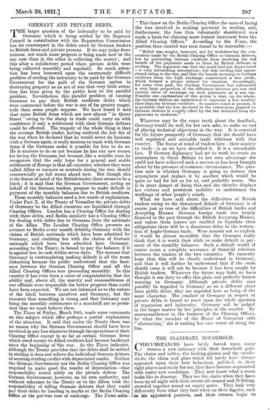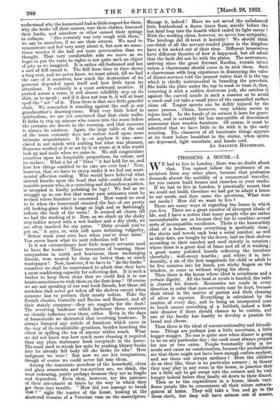THE INANIMATE HOUSEHOLD.
CIRCUMSTANCES have lately forced upon many women a new intimacy with their household gods. The chairs and tables, the looking-glasses and the candle- sticks, the china and glass which till lately have always appeared upon their best behaviour, polished, in their right places and ready for use, they have become acquainted with under new conditions. They now know what a room looks- like in disarray. They see the chairs when they have been up all night with their covers all creased and ill-fitting, crowded together round an empty grate. They look very differently from what they look when on their dignity, each .in his appointed position, and their owners begin to understand why the housemaid had so little respect for them, why she broke off their castors, tore their clothes, loosened their backs, and somehow or other caused their springs to collapse. " She certainly was very rough with them," . we say to ourselves, if we are their owners. We used to remonstrate and feel very sorry about it, but now we some- times wonder if she had not more provocation than we thought. That very comfortable sofa we move as we begin to put the room to rights is not quite such an object of pity as we imagined. It is rather old-fashioned and has a sort of frill round it. The frill from time to time shows a long rent, and we never knew, we must admit, till we had the care of it ourselves, how much the destruction of its garment depended upon itself and how little upon its attendant. It certainly is a most awkward creature. If pushed across a room, it will almost infallibly step on its skirt, so to speak ; and if it does not tear it, it will at least spoil the " set " of it. Then there is that nice little graceful chair. We remember it standing against the wall in our grandmother's drawing-room. With very little belief in spiritualism, we are yet convinced that that chair walks. It lurks to trip up anyone who comes into the room before the curtains are drawn in the morning, and that someone is always its mistress. Again, the large table at the end of the room certainly does not endear itself upon more intimate acquaintance. It is—or anyhow it was—asso- ciated in our minds with nothing but what was pleasant. Someone worked at it or sat by it or wrote at it who would look up and smile when we came in. We still congratulate ourselves upon its hospitable proportions, its colour, and its surface. What a lot of " litter ' it has held for us, and how few things confided to its care are ever lost ! Now, however, that we have to sweep under it we feel our senti- mental affection cooling. Who would have believed what shrewd knocks upon the head that table could deal to an amiable person who, in a crouching and defenceless position, is occupied in kindly polishing its legs I We feel as we struggle up to our feet that many past estimates must be revised where furniture is concerned. How vexed we used to be when the housemaid smeared the face of our pretty old looking-glass which hangs so high and so flatteringly reflects the back of the room ! It seemed all charm till we had the washing of it. Now, as we climb up the shaky step-ladder armed with a wet leather and a dry cloth, we are often insulted for our pains. " Dirty overall you've got on," it says, or, with still more irritating vulgarity, " Better wash your own face when you've done mine." You never know what its next reflection will be !
Is it not extraordinary how little respect servants used to have far books ! These treasuries of learning, these companions in mirth and heaviness, these unchanging friends, were treated by them no better than so much wastepaper ! Now, however, if we have to " do the books " ourselves we shall be constrained to admit that they have a most maddening capacity for collecting dirt. It is such a bother to keep them clean that we could find it in our hearts sometimes to wish them on the dust-heap ! Of course we are not speaking of our real book friends, but those old wretches that never get taken off the shelves except when someone has to perform their musty toilets. Take the French classics, Corneille and Racine and Bossuet, and all their stately company—they are magnets for the dust ! The revolving bookcase which harbours them exercises no cleanly influence over them, either. Even in the days of housemaids we distrusted that revolving bookcase. It always bumped any article of furniture which came in the way of its incalculable gyrations, besides knocking the elbow or spilling the tea of anyone within reach. What we did not know was how much more cleaning it required than any plain stationary book receptacle in the house. The maid used to wreak her spite by pushing library-books into its already full body till she broke its ribs ! How indignant we were ! But now we see her temptations, though of course we could never fall into them.
Among the inanimate members of the household, china and glass ornaments and tea-services are, we think, the most endearing, partly perhaps because they are so fragile and dependent. Even they, however, try the patience of their attendants at times by the way in which they get them into trouble. " How did you manage to break that " sighs the master of the house, looking at the shattered remains of a Venetian vase on the mantelpiece. Manage it, indeed ! Have we not saved the unbalanced little featherhead a dozen times from suicide before the last fatal leap into the hearth which ended its light career ? With the working china, however, we never lose sympathy. The hirelings did ill-treat it horribly ! We should think one-third of all the servant-tended plates in the kingdom have a bit nicked out of their rims. Different housewives have different theories of how it happened, but all admit that the fault did not lie with the plates. The newcomers, arriving since the great Servant Exodus, remain intact unless a charwoman should come in to nick them. Such a charwoman with long experience in destroying the value of dinner-services told the present writer that it is the tap which is chiefly instrumental in branding the porcelain. She holds the plate under the tap to wash or rinse it, then, removing it with a sudden dexterous jerk, she catches it against the curved nozzle in such a manner as to avoid a crack and yet take a small piece of the enamelled surface clean off. Teapot spouts can be deftly injured by the same process. China, however, very seldom seems to injure itself. In the hands of its owners it lasts for gener- ations, and is certainly far `less susceptible of demoniacal possession than wooden furniture. Of course, it must be admitted that we have little to do with it in the early morning. The character of all inanimate things appears at its worst before breakfast in the winter, when spirits are depressed, light uncertain, and hands cold.
AN AMATEUR HOUSEMAID.



































 Previous page
Previous page